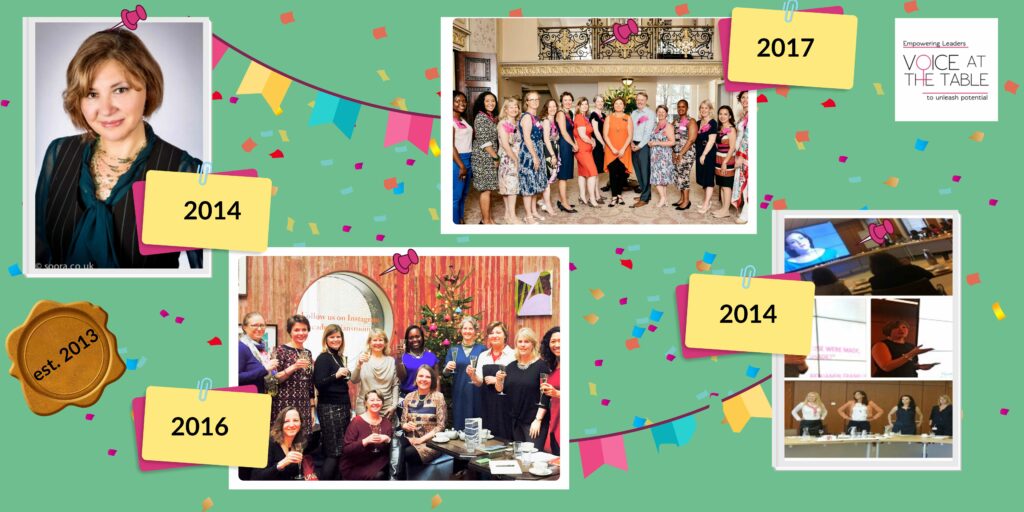By Rina Goldenberg Lynch & Suzanne Bird
The end of September marks our 10th anniversary. We are marking this milestone in several ways (keep your eyes peeled on this newsletter for more news on this!), including a look back at the learnings from a decade of EDI consulting. Today’s blog is the first part of an interview by Voice Associate Suzanne Bird, when I answered questions from our Associates about the first 10 years of Voice At The Table. The second part – coming out next week – covers my thoughts on what’s to come in the next 10 years, both for Voice and for EDI.
Suzanne: Congratulations on achieving this significant milestone. What’s been the highlight of the last ten years for you? What’s your proudest moment?
Rina: The biggest thing for me is making a difference. When I realise that people recognise and align with the Voice brand and our aims, I feel that we have made real progress. I don’t have one proudest moment, but every time someone recommends us, or someone visits our website and then gets in touch because they understand our philosophy, I feel proud of that. And a recurring highlight is whenever I realise our work has had a positive impact on an organisation.
Suzanne: How much have you learned in the ten years of Voice At The Table?
Rina: After three years, I started to feel I finally knew what I was doing. After five years, I felt now I REALLY know what I’m doing, and at ten years I feel much the same.
It’s been a little like raising a child, being appropriately hands-on and nurturing at each stage. So we’ve gone from the baby stage to the toddler stage, then starting school and now the company/child is ten years old. Our area of expertise is as complex as human nature itself, so I feel, no matter how much I already know, there’s still so much more to learn.
Suzanne: How have things turned out differently from what you expected when you set up Voice ten years ago?
Rina: When I quit my corporate law job, I gave myself a year to get back to my corporate earnings and it’s taken nearly ten years!
It’s been a steep learning curve and I have realised that being a lawyer doesn’t necessarily prepare you for running your own business. I am tenacious, and I like change and learning, which are basic attributes required to be an entrepreneur. So are the ability to be self-aware, resilient, and able to face difficult truths sometimes. But there are still areas of running the business that I feel it’s better to leave to others. I suppose that’s true of every person, so it’s about knowing what to focus on and what to let go of and let others do.
So, to answer your specific question: everything turned out differently from expectations, but I would say that all of it was and is great!
Suzanne: What has been your most interesting client engagement?
Rina: The most interesting client engagement is always the one I am currently working on – and this is not a cop-out! We have evolved, and the work we do continues to evolve as we constantly look for new and better ways to deal with client challenges. This means that each new project that we take on is the most interesting as we look for the next new ideas and collaborations.
Suzanne: What have been the top 3 key challenges you’ve seen for organisations in Equity, Diversity and Inclusion (EDI)?
Rina: One fundamental challenge is that it is very difficult to maintain people’s motivation and commitment to EDI. It takes a lot of staying power to progress through the EDI Journey. It needs to be front of mind at all times, and that’s a difficult reality for many organisations to embrace.
Another one is to have the ability to look in the mirror and be truthful about what you see. I’ve learned to do this and still reel from some of what’s looking back at me (and it’s nothing to do with aging 😊); many of the people we work with find this extremely challenging, especially the more senior they are. This is not easy and not many can truly do it, but it is the secret to successful change.
These two key challenges combined show that it takes a combination of resilience, inquisitiveness and self-awareness to constantly improve.
I’d say that probably the biggest (and third) challenge is to overcome the constant strive to look for simple solutions to incredibly complex challenges. The EDI journey requires patience and a deep understanding of the cause underlying the symptom; a sticking plaster approach is not going to reap the benefits people are after when it comes to EDI.

Suzanne: What’s an example of poor EDI practice you saw a lot of 10 years ago that we have now moved beyond?
Rina: When I started out, my aim was to work towards greater gender equality and help women succeed by making them (us) more confident, gain gravitas, training them to be better leaders… but then I quickly realised: there’s nothing wrong with women! We now understand that the issue goes deeper, rooted in the system itself. For example, we have seen that it doesn’t work to parachute women into board positions without changing the existing culture that made it difficult for women to get there in the first place.
Now, there’s a lot more emphasis on creating an inclusive environment which will lead to greater Diversity. This is why I say that Diversity is the reward for Inclusion, because only a truly inclusive environment enables the ability to tap into people’s diversity of thought.
Suzanne: What one thing has helped to shift the dial or been a game-changer in this space?
Rina: A combination of COVID and George Floyd’s murder have led to a fundamental shift in the way that companies view and talk about Diversity. I don’t think that one or the other alone would have led to this shift. We’ve had pandemics before and the treatment of Black men by the police force in the US has long been documented (and continues to be highly problematic). In my opinion, it’s the fact that when George Floyd was murdered, the world was more sensitive to this atrocity given how much suffering and fear everyone was feeling during COVID. I think it somehow made the incident more real and more relatable to people, so it built an important momentum for EDI that continues to prevail.
Suzanne: In what way has Voice At The Table had the biggest impact?
Rina: Our biggest success is to help people recharacterise how they see and think about EDI. We’ve shifted the conversation from having to solve a problem to a conversation about the opportunities it provides. We now talk about the opportunity costs of not being more inclusive, by missing out on that highly valuable asset that is diversity of thought. So, rather than relying on the benevolence of white educated men to be more inclusive, EDI is fast becoming something they know they’d be fools not to embrace. And this is real progress.
If you would like to tap into our experience in helping organisations navigate the EDI Journey, why not set up an Ask Me Anything call with Rina?
Suggested Reading
Where Are You on the EDI Journey?




